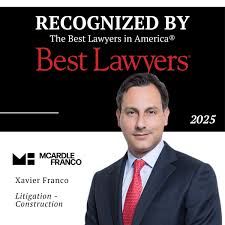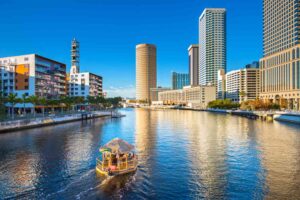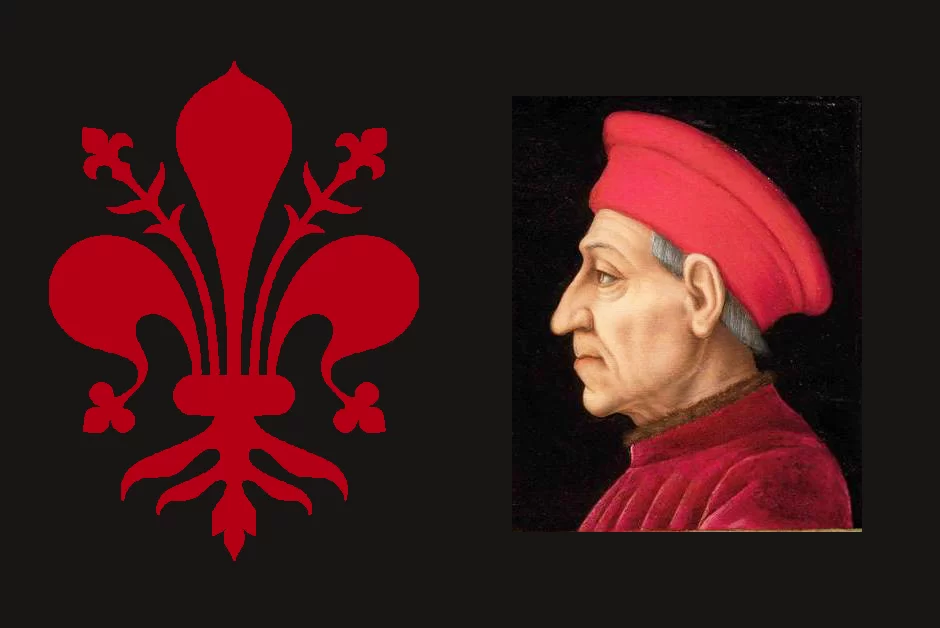
By Brian B. French
In the grand sweep of history, there are figures whose influence transcends their own time, reshaping the world in ways that echo across centuries. One such individual is Cosimo de’ Medici, a man whose vision, power, and unrelenting ambition left an indelible mark on the course of history.
The name Medici may be synonymous with wealth and power, but to reduce Cosimo’s legacy to mere riches would be a profound misunderstanding of his world-changing importance. He was not just a banker or a patron of the arts—he was an architect of the Renaissance, the man who laid the foundation for modern Western civilization.
A World Before Cosimo
To fully grasp the gravity of Cosimo de’ Medici’s impact, we must first understand the world he inherited. In the early 15th century, Europe was emerging from the shadows of the medieval era. The continent was marked by feudalism, fractured city-states, and a stagnant intellectual climate. Art and science were stifled by religious dogma, and commerce remained largely localized. Florence, Cosimo’s birthplace, was a city of potential, but it was plagued by political instability and economic uncertainty.
Into this fractured world, Cosimo de’ Medici was born in 1389. The Medici family was already wealthy, but Cosimo’s father, Giovanni di Bicci, had begun the transformation of the family from wealthy merchants into powerful bankers. It was Cosimo, however, who would take the reins of the family empire and elevate it to unprecedented heights, changing the course of history in the process.
The Birth of the Renaissance
Cosimo’s most profound contribution to the world was his pivotal role in fostering the Renaissance—a cultural revolution that would forever alter the intellectual and artistic landscape of Europe. It was through his generous patronage of the arts, sciences, and humanities that Florence became the beating heart of this extraordinary movement.
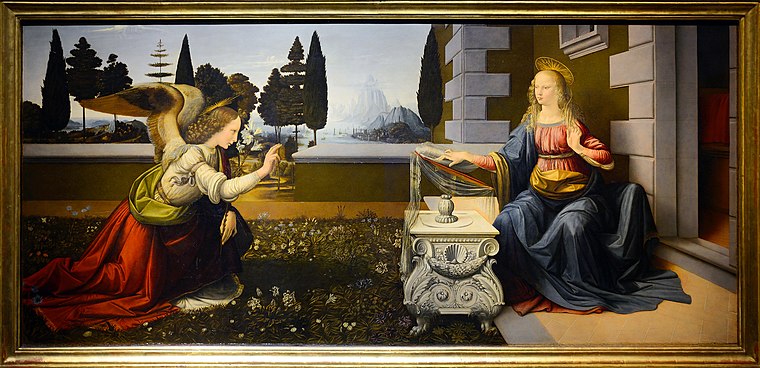
The Annunciation by Leonardo da Vinci, dated to c. 1472–1476
Unlike many rulers or wealthy figures of his time, Cosimo understood that knowledge and creativity were the true keys to power and progress. He surrounded himself with the brightest minds of his era, funding scholars, artists, and architects who would go on to redefine Western thought and aesthetics. Without Cosimo de’ Medici, it is unlikely that figures like Leonardo da Vinci, Michelangelo, Botticelli, Donatello, and Filippo Brunelleschi would have achieved the heights they did. It was Cosimo’s money that financed Brunelleschi’s revolutionary work on the Florence Cathedral’s dome—a marvel of engineering that still inspires awe today.
A Visionary Beyond His Time
Cosimo was more than a mere patron; he was a visionary. He recognized that the ancient texts of Greece and Rome held the key to reviving Europe’s intellectual life. To this end, he invested heavily in the retrieval and translation of classical works, commissioning scholars to travel to distant lands to recover forgotten manuscripts. His establishment of the Medici Library was not only an intellectual feat but also a deeply political one. Cosimo understood that knowledge was power, and by controlling access to it, he could consolidate his influence over Florence and beyond.
His efforts did more than revive old knowledge—they ignited new thinking. The Renaissance brought about a profound transformation in how people viewed the world and their place in it. The rediscovery of ancient philosophy fueled the rise of humanism, a movement that placed the individual at the center of the universe, celebrating human potential and achievement.
This shift in thinking laid the groundwork for the Enlightenment, the scientific revolution, and the modern world itself. Without Cosimo’s vision, the Renaissance might have remained a dimly lit cultural flicker, rather than the blazing intellectual firestorm it became.
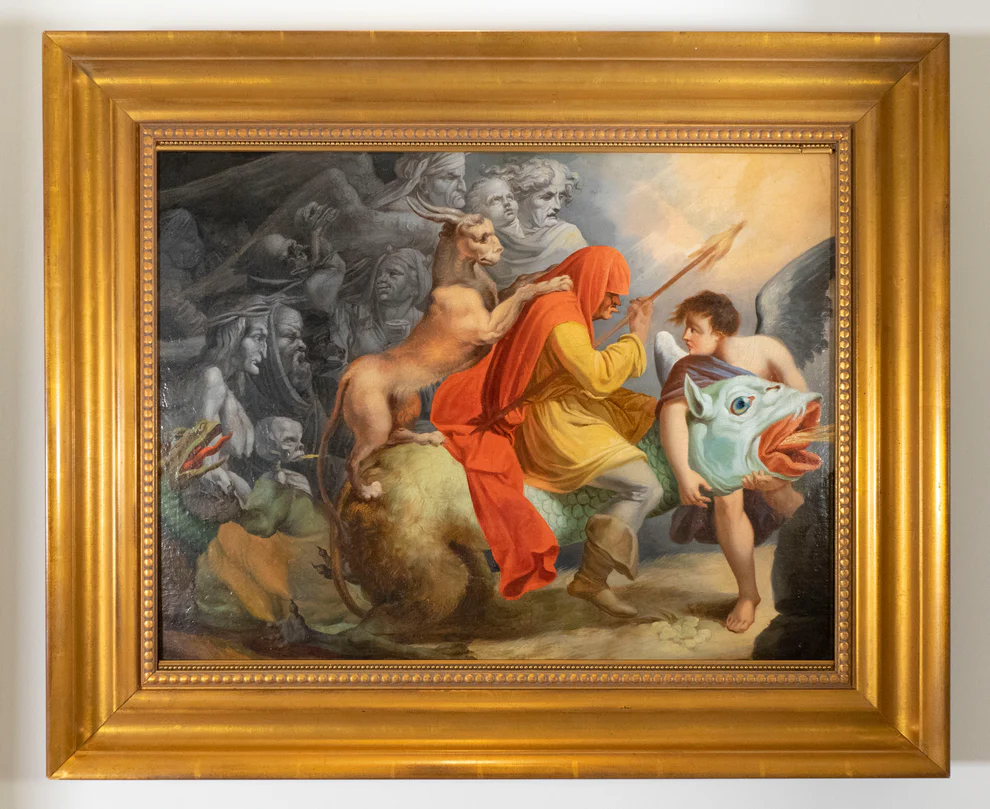
Our painting “Witches Sabbath” by or after Girolamo Francesco Maria Mazzola, more commonly, as Parmigianino (1503-1540) visit Wondrous-Things.com
Political Mastery: The Power Behind the Throne
Cosimo’s genius, however, was not confined to the arts and intellectual pursuits. He was a master politician, adept at maneuvering through the treacherous waters of Florentine politics. Though he held no official title, Cosimo was the undisputed ruler of Florence for over thirty years. Through shrewd alliances, strategic marriages, and the subtle application of his immense wealth, he controlled the city with an iron grip wrapped in velvet.
Cosimo’s ability to consolidate power without ever being crowned a king or duke set a new standard for political governance. His method of ruling from the shadows—maintaining the appearance of republicanism while holding absolute power—became a model for future generations of political leaders. It was a precursor to modern democratic structures, where influence is often wielded without the need for overt titles or authoritarian measures.
Cosimo’s legacy extended well beyond Florence. By securing Florence’s position as a major European financial and cultural center, he influenced the political and economic landscape of Europe. The Medici bank became one of the most powerful financial institutions in Europe, lending money to kings, popes, and emperors. Cosimo’s deft political touch ensured that Florence remained stable and prosperous in a time when other city-states crumbled under the weight of factionalism and external threats.
A Lasting Legacy
Cosimo de’ Medici’s death in 1464 did not mark the end of his influence. Far from it. His legacy was cemented in the very fabric of Florence, in the Renaissance he had helped to birth, and in the power structures he had built. His descendants would go on to rule Florence and later Tuscany, producing popes, queens, and rulers who continued the Medici tradition of patronage and political influence.
The world we live in today—defined by its embrace of knowledge, art, and individual potential—owes much to Cosimo de’ Medici. Without his foresight and support, the Renaissance might have withered before it could bloom, and the modern era, shaped by scientific inquiry and artistic innovation, may have taken a far different path.
Cosimo was a man who understood that true power lies not in wealth alone but in the ability to shape minds, hearts, and cultures. He changed the world not by conquering lands or waging wars but by fostering creativity, knowledge, and progress. In doing so, he set the stage for the world we know today.
Cosimo de’ Medici was more than a powerful banker or a cunning politician—he was a world-changer. His impact on art, politics, and philosophy cannot be overstated. By nurturing the Renaissance, he ignited a flame that would guide Europe out of the darkness of the medieval period and into the light of modernity. Cosimo’s legacy lives on in the art that adorns our museums, the architecture that inspires our cities, and the very way we think about humanity’s place in the world. In every sense, Cosimo de’ Medici helped shape the modern world for which we all should be thankful.
